As parents, we've all told little white lies here and there – in fact with Christmas still, in our rear-view mirror, we're sure there are plenty of us telling little lies to keep some of the Christmas spirit alive a little longer.
And no, we're not about to tell you that you shouldn't do that – we're not here to bust your magical bubbles. But we are here to elaborate on a viral REDDIT thread that made us have a good, hard look at ourselves.
Some lessons are sensible, brought about from love. And sometimes important life lessons are brought about to teach a sense of responsibility or work ethic, such as how success comes from hard work. If someone's not treating you kindly, you might teach that you should reflect on your behaviour first to make sure you adopt good manners and treat them as you wish to be treated.
And other lessons are a little more archaic, brought down from generation to generation without a lot of thought. Those are the lessons we explore today.
Ignore it and it will go away
No, we're not talking about the bee, busily buzzing about your yard, seemingly targeting your fearful toddler. We're talking about the other kids who are not-so-nice to yours. If your children dare to speak up about someone or something that is taking the wind out of their sails, sit, listen, and help them take action. If there's something we've learnt, it's that ignoring the problem only prolongs the inevitable, causing torment until it's resolved.
‘Children should be seen and not heard'
So many new parents have been raised this way and boy, wasn't it damaging?! We can only hope that we now understand that every voice is important and that these little people in our lives can teach us essential life lessons. It's important to empower children, encourage their self-worth and make them feel that they can teach us an important life lesson.
Stranger danger
This one is clear and there's no way children should be taught that the only dangerous people in our lives are our strangers. Sure, it's not great to chat with an unknown person and give them all your secrets. Nor is it ideal to ride in cars with strangers. But sometimes, when they're lost or feeling unsure, they should seek help from ‘helpful strangers'. We should teach children that these helpful strangers could be shop owners, police, security, or teachers. Teaching kids that sadly, our family and friends can also present danger is also very important. We may not need to point that out, but it takes us back to point one – don't ignore it, it will not go away. Speak up and be heard.
Finish your plate
Because we're so concerned about our child's nutrition, we feed them what we think they should be eating and at the quantity we believe is right. But every child is different and their daily requirement, like ours, differ. It could be that they've not been as active that they're not as hungry or they just don't feel right. Setting expectations is great but force-feeding your child is not. It's best not to make the dinner table a battleground. It's likely to end in misery for everyone and potentially teach your child to build terrible relationships with food.
If he hits you, he likes you!
We don't even know how this one has survived so long but if this isn't a BIG. RED. FLAG. we don't know what is. That is NOT how we tell someone we like them. Rather than this lesson, we should've turned our attention to the hitter and taught them how to express their feelings. We're sure that if our adult child told us her partner hit her but it's just their way of showing love, we'd stage an intervention!
Forced apologies
The best way to get a child to apologise is to model the apology. After all, kids learn from adults. Actively own up to making mistakes, even if they're intentional. For example, your child asked for the red cup but you intentionally gave the blue. They refuse to drink, demanding the red cup. Apologise and offer to tip the drink into the correct colour cup.
The more a child sees you behave the way you want them to, the more they will understand their expectations.
Adults are always right
As parents, we know that most of us are fumbling through and we're working it out as we go. We need to let our children know that while they need to respect us, we too are working out each stage of life as we go, filling our glass half full or empty- whichever way we choose to go. We're not always right, we do make mistakes but when we do, we own them. We also make sure that we treasure all other life lessons.
Got an outdated lesson you'd love to see scrapped? We'd love to hear from you! Email the team on editor@careforkids.com.au to get in touch.
































